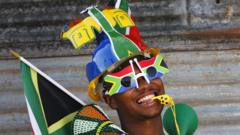The Oxford English Dictionary (OED) has recently made headlines by adding a selection of South African words to its latest update, emphasizing the country’s rich linguistic heritage. These additions include informal expressions and colloquial phrases that encapsulate unique elements of South African culture and social interactions.
Among the new entries is "Yoh," an interjection derived from Afrikaans and isiXhosa, which expresses surprise or admiration. Another noteworthy term, "gatvol," is recognized for describing feelings of frustration, showing the dictionary's acknowledgment of everyday South African sentiments. Meanwhile, "tjoekie," referring to jail, highlights the influence of English-speaking Indian immigrants on local vernacular.
The dictionary has also included "seshweshwe"—a term denoting a distinct printed cotton fabric—and "makarapa," a word initially tied to construction but now linked with the fervent spirit of South African sports fans. Other terms like "zol," a slang for marijuana, and "moggy," which describes someone irrational, showcase the dynamic nature of South African slang.
These additions form part of a broader trend where the OED incorporates "untranslatable words" from different cultures, reinforcing the importance of representation in global language platforms. As South Africa proudly integrates its linguistic quirks into the OED, it highlights the influence of its diverse populace and heritage on the English language worldwide.
As nations increasingly recognize the significance of linguistic diversity in global discourse, the inclusion of South African words signifies a growing appreciation for cultural uniqueness, ultimately enriching the larger tapestry of language.
Among the new entries is "Yoh," an interjection derived from Afrikaans and isiXhosa, which expresses surprise or admiration. Another noteworthy term, "gatvol," is recognized for describing feelings of frustration, showing the dictionary's acknowledgment of everyday South African sentiments. Meanwhile, "tjoekie," referring to jail, highlights the influence of English-speaking Indian immigrants on local vernacular.
The dictionary has also included "seshweshwe"—a term denoting a distinct printed cotton fabric—and "makarapa," a word initially tied to construction but now linked with the fervent spirit of South African sports fans. Other terms like "zol," a slang for marijuana, and "moggy," which describes someone irrational, showcase the dynamic nature of South African slang.
These additions form part of a broader trend where the OED incorporates "untranslatable words" from different cultures, reinforcing the importance of representation in global language platforms. As South Africa proudly integrates its linguistic quirks into the OED, it highlights the influence of its diverse populace and heritage on the English language worldwide.
As nations increasingly recognize the significance of linguistic diversity in global discourse, the inclusion of South African words signifies a growing appreciation for cultural uniqueness, ultimately enriching the larger tapestry of language.



















